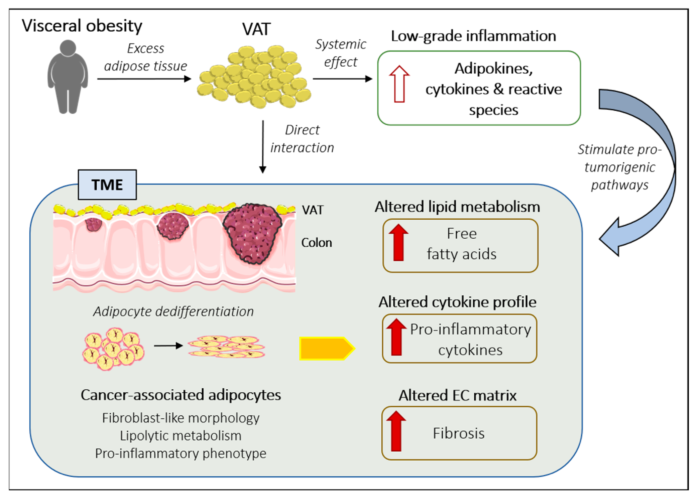
The Alarming Connection: Linking Colon Cancer and Obesity
Introduction
While obesity has long been linked to numerous health complications, including diabetes and heart disease, a lesser-known but equally alarming connection is emerging – the link between obesity and colon cancer. Colon cancer, also known as colorectal cancer, is a type of cancer that affects the colon or rectum. With the rising rates of obesity worldwide, it is crucial to understand this link and take measures to prevent and manage both conditions.
Understanding the Connection
Recent studies have shed light on the association between obesity and colon cancer. Research has indicated that individuals who are obese have an increased risk of developing colon cancer compared to those with a healthy weight. Furthermore, the link is more prominent in men than women.
One possible explanation for this connection lies in the changes that occur in the body due to obesity. Adipose tissue, or fat cells, release certain substances that can promote inflammation and lead to the development of cancerous cells. Additionally, obesity is often accompanied by high levels of insulin and insulin-like growth factors, which can stimulate the growth of tumors.
Obesity and Colon Cancer: The Numbers
The statistics providing insight into the connection between obesity and colon cancer are concerning. According to the American Cancer Society, approximately 1 in 20 individuals will develop colorectal cancer at some point in their lives. Furthermore, obese individuals have a 30% higher risk of developing colon cancer compared to those with a healthy weight. The risk increases as the degree of obesity escalates, making it crucial to address weight-related concerns proactively.
Prevention Strategies
Although genetics play a role in the development of colon cancer, lifestyle factors such as diet and physical activity are equally significant. Therefore, adopting healthy habits is paramount in preventing both obesity and colon cancer. Here are some strategies to consider:
1. Maintain a Healthy Weight: Since obesity is a significant risk factor for colon cancer, maintaining a healthy weight is crucial. This can be achieved through a balanced diet and regular exercise.
2. Eat a Nutrient-rich Diet: Focus on consuming a variety of fruits, vegetables, whole grains, lean proteins, and healthy fats. Limit the consumption of processed foods, sugary snacks, and excessive red and processed meats.
3. Stay Active: Engage in regular physical activity, such as brisk walking, jogging, cycling, or swimming, for at least 150 minutes per week.
4. Limit Alcohol Consumption: Excessive alcohol consumption has been linked to an increased risk of colon cancer. It is recommended to limit alcohol intake to moderate levels, which means up to one drink per day for women and two drinks per day for men.
5. Avoid Smoking: Smoking is a risk factor for various types of cancer, including colon cancer. Quitting smoking or never starting is essential for overall health.
Frequently Asked Questions (FAQs)
Q: Is it possible to develop colon cancer without being obese?
A: Yes, it is possible to develop colon cancer even without being obese. Various factors, including genetics, age, family history of cancer, and certain medical conditions, contribute to an individual’s risk of developing colon cancer.
Q: Can losing weight reduce the risk of colon cancer?
A: Yes, losing weight can help reduce the risk of colon cancer. Studies have found that weight loss through lifestyle changes, such as a healthy diet and regular exercise, can decrease the risk of developing colon cancer.
Q: What are some early signs and symptoms of colon cancer?
A: Common signs and symptoms of colon cancer include changes in bowel habits (such as diarrhea or constipation), blood in the stool, abdominal pain or cramps, unexplained weight loss, and fatigue. However, it is important to note that these symptoms can also be caused by other conditions, and a medical professional should be consulted for proper diagnosis.
Q: Are there screening methods available for colon cancer?
A: Yes, several screening methods are available for colon cancer, including colonoscopy, sigmoidoscopy, and stool tests. These tests can help detect precancerous polyps or early-stage colon cancer, allowing for early intervention and improved outcomes.
Conclusion
The weight of evidence implicating obesity as a risk factor for colon cancer is growing, emphasizing the need for individuals to address weight-related concerns and adopt a healthy lifestyle. By maintaining a healthy weight, engaging in regular physical activity, and making nutritious food choices, individuals can reduce their risk of developing both conditions. Additionally, regular screenings and prompt medical attention for any concerning symptoms are crucial for early detection and effective treatment. Taking proactive steps today can pave the way for a healthier future, free from the burden of colon cancer.

















